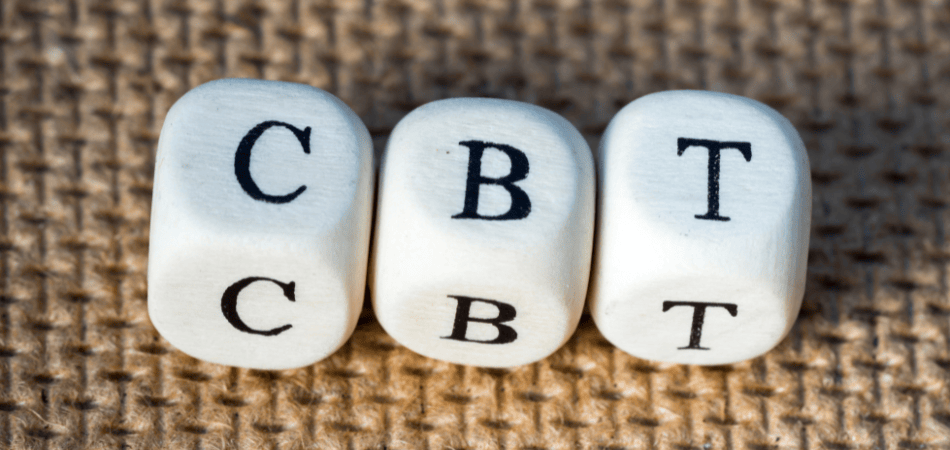Last Updated:
April 6th, 2023
Cognitive Behavioural Therapy (CBT)
Struggling with addiction can be incredibly difficult, causing physical and mental pain as you attempt to break unhealthy habits, and it can often feel like you’re completely alone. Cognitive Behavioral Therapy (CBT) is an evidence-based approach that helps people address their unique challenges and recovery goals while also addressing underlying thoughts or behaviours that contribute to substance misuse.
By arming yourself with CBT strategies at addiction rehab, you can take the necessary steps on your road to recovery, led by non-judgemental and supportive staff with your best interests at heart.

What is CBT?
Cognitive Behaviour Therapy (CBT) is a type of psychotherapy that helps individuals modify their behaviours and beliefs to change their feelings. Developed by clinical psychologist Aaron T. Beck in the 60s, CBT is most commonly used to help people with depression, anxiety, OCD, addiction, and many other mental health disorders.
It can help individuals to reduce their addictive behaviour, manage their cravings, gain insight into the triggers of their behaviour and empower them to make positive changes. The therapy has become popular as an addiction treatment due to its success rate in helping individuals overcome drug abuse and other forms of addiction.
Traditional insight-oriented therapies focus on delving into past experiences to gain an understanding of present issues. CBT focuses more on problem-solving for current issues with identifiable goals backed up by research and scientific evidence. This allows the treatment to be recognised as an evidence-based treatment.
CBT has successfully treated various substance addictions, behavioural addictions and disorders. These include but are not limited to the following:
- Alcohol addiction
- Drug Addiction
- Gambling addiction
- Sex addiction
- Eating Disorders
- Anxiety
- PTSD
- Depression
The success of CBT has been well-documented over the years. Since the emergence of the practice in the 60s, experts have constantly re-invented, updated and improved the therapy.
Recent studies on anxiety disorders, eating disorders such as Bulimia, personality disorders, stress management, depression and Addiction and Substance Use Disorder showed that CBT was (as high as) 87% more effective than other therapies commonly used to prevent and treat existing issues.
Specifically, certain studies showed CBT was significantly help people struggling with alcohol addiction, opiate dependency and methamphetamine addiction.
How does CBT work at an addiction centre?
Approaching mental health issues with a large variety of tools and resources will give the best possible chance of overcoming them, and CBT can be viewed as one of these tools.
The therapy aims to spotlight an individual’s thoughts, feelings, beliefs and behaviours and tries to recondition them. It has been proven to be an effective tool for reducing and managing cravings, as well as treating substance use disorders. The basic premise of CBT is that our thoughts affect our feelings and behaviours; hence by changing the way we think about things in relation to addiction, we can ultimately learn how to live healthier lives without using substances. The main aim is to help you identify patterns in your thinking that could lead to potential relapses, allowing you to learn how to respond differently in challenging situations.
It’s almost the same as finding a new use for an existing item. Have you ever used an everyday household item such as a key or a fork to open a pesky, wrapped-too-tightly package? That’s precisely how CBT aims to change unwanted thoughts. It takes an existing, problematic idea such as;
“I consume addictive drugs because it helps me cope with life’s problems”
And reinstates it as a positive thought;
“The drugs are making life’s problems worse and I need help to quit”.
The therapist will try to pinpoint the exact part of the thought process causing you to turn to the very thing that you may be addicted to.

How long does CBT take in addiction rehabilitation?
Before beginning therapy, you must ensure you go into your sessions with a slightly more open mind than usual. It could take some time before you feel confident enough to share some of your feelings with a stranger, but always remember that a therapist is there to help. The first time you meet your therapist, it will be more of a ‘getting-to-know-you’ session. This will allow the opportunity to highlight the main issues, state goals and targets and make plans.
Primrose Lodge sessions, with a qualified therapist, typically last 45-60 minutes and are usually conducted once a week for the duration of your stay. CBT is integrated into group therapy sessions and one-to-one therapy if needed.
It is important to note that no one is ever cured of addiction, but recovery can be found and the illness kept at bay. The only permanent relief we suggest for addiction is complete abstinence, but as a chronic relapsing brain condition, the root causes must be addressed for the individual to stay sober. By undergoing CBT therapy, our patients have a better awareness and understanding of themselves. They can think more clearly and apply reason and truth to their thoughts.
“We can’t solve problems using the same thinking we used when we created them.”
– Albert Einstein
Primrose Lodge CBT Programme
At Primrose Lodge, we use CBT as part of many methods and tools to treat our patients. CBT can be successfully delivered in many ways and, when combined with other clinically proven therapies, can provide some of the best results possible. We use CBT throughout our programme, in individual sessions and group therapy.
Our Counsellors use person-centred methods of treatment, meaning we fully consider the individual’s needs. We aim to provide you with the tools you need to live a happy and trouble-free life long after you have left our treatment centre. In fact, Primrose Lodge offers the chance for you to continue weekly group therapy sessions after the rehabilitation period has ended, for up to one year.
By undergoing CBT therapy, our patients have a better awareness and understanding of themselves. They can think more clearly and apply reason and truth to their thoughts.
For more information on our CBT programme or any other aspect of our recovery programme, please don’t hesitate to contact our expert team, who can assist you further.
